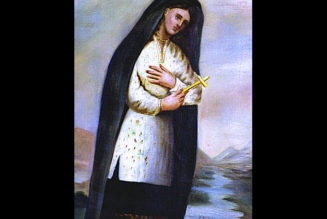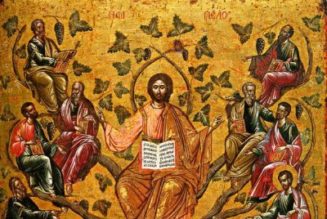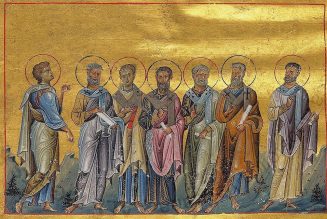
The issue of protecting the life of unborn children in the womb has been the central issue for American Catholics for almost half a century. Furthermore, many Catholics think they have an obligation to vote for the pro-life candidate who has the greatest chance of winning. But at what point does a candidate who promotes pro-life legislation go too far in many the other areas of Catholic social teaching? Do Catholics have an obligation to vote for someone who leads the government into other grave violations of human dignity, just because he or she is opposed to abortion?
With many other Catholics, I have concluded that voting for the anti-abortion candidate who is most likely to win does not fit with our duty as Catholics to uphold all the truths taught by the Catholic Church when that candidate’s other views conflict with other important life issues. In this position, I see myself following the example of Bl. Franz Jägerstätter who was pressured by fellow Catholics including priests and bishops to support the Nazi Socialist Party in Austria in the 1930s and 40s. They told him that he had to do it for the Fatherland—but he felt that he could not participate in the evils promoted and actually committed by the Nazi Socialist Party.
I am not saying that our political parties are as evil as the Nazis, yet. But they support many elements in American society that degrade the dignity of the human person. Since a government has a moral duty to protect and respect the dignity of all humans in its realm and not violate the dignity of noncitizens, all of these things must be taken into consideration by Catholics
The USCCB presents these important considerations in their rereleased document, Forming Consciences for Faithful Citizenship. In this document, the bishops apply the tradition of Catholic social teaching to issues we are facing in the United States today. While they emphasize ending the evil of abortion as the preeminent “priority because it directly attacks life itself,” they also bring attention to “other serious threats to human life and dignity such as racism, the environmental crisis, poverty and the death penalty,” and to issues like the inhuman treatment and lack of due process for families coming to our borders in crisis, gun violence, health care reform, and attacks on the essential nature of the human person as male and female.
When the only anti-abortion/pro-life candidate who is likely to win stands for and promotes a large number of issues that violate human dignity, Catholics face a difficult decision. After we have formed our conscience in the fullness of truth, reasoned about the weight of the importance of various issues, and have found that the two major-party candidates and platforms do not promote enough of the fullness of truth about human dignity, we have to make some decision.
I contend that it is morally permissible, or even recommended, for Catholics either to vote for a third-party candidate* who is both pro-life regarding abortion and has stances consistent with many other aspects of moral truth or to turn in a blank ballot. When there is not a candidate worth voting for, then it is best to not vote for any. This is so even if a major-party candidate supports Catholic social teaching on some issues, like abortion, and stands a good chance of winning the election.
St. Thomas Aquinas explains in the Summa Theologiae that it is wrong to not follow one’s conscience, but also that one has an obligation to form one’s conscience (I-II, Q. 19, Art. 5-6). He explains that we are responsible if we do not fully form our consciences in accord with the fullness of truth. The Church gives us examples of this sort of political act in some of her saints. The drive to not compromise the fullness of moral truth for the sake of worldly success is the same drive that led Bl. Franz Jäggerstätter and similarly St. Thomas More and to stand against the unjust governments of their respective times and ultimately give up their lives. For them it was the love of truth and desire to do what was right that led them to make their stand.
St. Thomas More was an influential government leader who refused to support King Henry VIII in separating the Church of England from the Roman Catholic Church. Bl. Franz Jägerstätter in his position against his government was a simple Austrian peasant as he courageously refused to take the oath to support Adolf Hitler and serve under the National Socialists in the military.
Both men knew that they faced hopeless cases politically. They both knew that they would forfeit their lives if they did not agree to support an evil leader of a government. Nearly all the other Catholics that both men knew chose to go along with the evil done by the government. Both men knew their choice to stand against it would not stop the leader from making evil choices. But both had to follow their consciences. They both supported a hopeless cause, but they chose to support the truth anyway.
In his personal notebooks, Bl. Franz described German-speaking Catholics as people engulfed in a stream they would have to struggle to escape, that stream being the National Socialist party, which Pope Pius XI had spoken out against. The German Church supported that party’s rule out of fear of losing its liberties. But Bl. Franz asked in his writings, “Have church officials reached the decision that it is now permissible for Catholics to belong to a party that opposes the church?” (Franz Jägerstätter: Letters and Writings from Prison, Notebook II, p. 174) Catholics today run the risk of being engulfed in the stream of either major political party. But it is our moral duty to examine each party and discern if either is worth supporting.
Now, unlike in the cases of St. Thomas More and Bl. Franz, the way that a Catholic chooses to vote in an election in the United States is not a matter of physical life and death for him or her. But it is clear that the major parties do not promote respect for the human dignity of all persons: the unborn, the poor, the worker, the elderly, families, the oppressed, etc. It is also clear that how we vote is a moral act, and that like any moral act, it affects the life of our souls. Like Bl. Franz and St. Thomas More, we have to make political choices that aim at protecting the truths of the Church and the moral truth that all humans have dignity and deserve to be treated as such.
As in the cases of St. Thomas More and Bl. Franz, it is worth aiming at these goals with our votes, regardless of whether our choice stands any reasonable chance of success. It may be that turning in a blank ballot or voting for a third-party candidate aims at these goals better than voting for a major party candidate. Each Catholic must weigh all of the relevant information in their consciences, and the right choice in not always clear. But turning in a blank ballot or voting for a third party send will send a message about the Catholic vote: that we must protect the unborn and all vulnerable people and that our two major parties are not doing enough. Just as in the acts of St. Thomas More and Bl. Franz, this is worth saying, even if it has no immediately apparent effect.
*One third party many faithful Catholics are supporting is the American Solidarity Party, which has based its platform on the successful Christian Democrat parties in Europe and Catholic Social Teaching.
Join Our Telegram Group : Salvation & Prosperity









